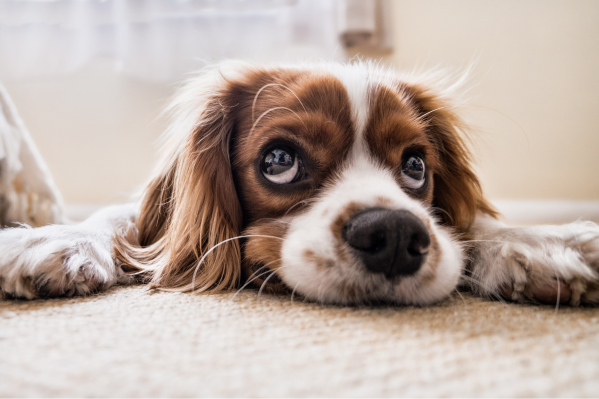Most dogs will experience the symptoms of constipation at some point in their lives. As a pet parent, it can be hard to know what the cause might be or what to do about it.
We'll review the signs your dog is constipated, causes of constipation in dogs, and how to treat it so your pup can feel their best.
Signs your dog is constipated
The symptoms of constipation involve straining to poop and sometimes producing small and hard stools. These symptoms are also seen with some other conditions like inflammation of the colon (colitis), diarrhea, and even straining to urinate, which can make it more difficult to know if your dog is truly constipated or has some other condition.
"Most of the time when a dog strains to defecate, he isn’t constipated at all," says Dr. Jo Myers, DVM. "The most common circumstances under which a dog will strain to have a bowel movement is when his colon is irritated but empty. In other words, most episodes of straining to poop are associated with diarrhea and are essentially the opposite of constipation."
Talking to a vet about the symptoms of constipation in your dog is always a good first step to help you determine whether it is a potential worry.
Causes of dog constipation
If your dog is constipated with no other signs of illness, it's not necessarily a cause for concern. Dogs that are ill or showing symptoms like vomiting, lethargy, or no appetite will need prompt veterinary attention, however.
The colon is designed to store poop for a period of time while excess water is reabsorbed from the stools into the body before the pet eliminates the stool. Any condition that ends up in the stool being kept in the colon for a longer than usual period can thus lead to constipation.
Potential causes of dog constipation can include but are not limited to:
Change in diet—This can especially happen if the diet is poorly digested or is too high or too low in fiber.
Decreased exercise—Exercise helps to keep the food moving through the gut and in that way helps with elimination of stools.
Overgrooming—Severe overgrooming can result in a lot of hair ending up in the colon which can make it difficult to pass stools. In these cases, these pets will often have to be treated for the cause of the overgrooming rather than the constipation.
Ingesting something indigestible or irritating—If your dog has eaten something that cannot be digested like sand, bones, or other foreign objects, it will often move through the gut into the colon. It can make the stool dry and difficult to pass or can irritate or hurt the colon, causing straining and struggling to pass the stool.
Parasites—Large amounts of internal parasites can irritate the gut and cause straining.
Dehydration—Dehydration often leads to large amounts of water being absorbed from the stool in the colon. This will result in hard, dry stools that are difficult to pass.
Medication—Certain medications can cause constipation as a side effect in dogs.
Illness—Certain diseases can make it difficult for the colon to contract normally and thus eliminate stools. Spinal cord injuries, nerve injuries in the pelvis itself, hypothyroidism, and electrolyte disturbances can affect the colon.
External pressure on the colon—Pressure from outside the colon can also restrict the passage of stool through the colon. An old pelvic fracture, an enlarged prostate or other organs surrounding the colon, or a growth pressing on the colon are examples of this.
Pain—If your dog experiences pain when they need to crouch to poop, they might try to avoid going regularly and thus become constipated.
Megacolon—This is a condition where the colon is stretched out and cannot contract to eliminate stool properly. It's more commonly seen in cats.
Treatment for dog constipation
If your dog is constipated, it's important to seek advice from a veterinary professional, as pet parents should not try to treat this on their own. Some over-the-counter human preparations for the treatment of constipation can be toxic to dogs, so they should be avoided unless advised by your vet. It's also very important your vet treats the cause of the constipation and not only the constipation itself. However, there are some things that can potentially help things get moving.
Enema
An enema can be an effective treatment for constipation. In general, your vet will perform the enema at the clinic, as you can inadvertently cause more damage if it's not done correctly. For that reason, it's best not to try home treatment unless your vet has recommended for you to do so and given you precise instructions.
Adjust your dog's diet
With the help of a veterinarian or veterinary nutritionist, you can adjust your dog's diet to help them have healthy bowel movements.
Depending on the cause for your dog’s constipation, this might mean adding more fiber or using a low-fiber diet. Sometimes a specific pet will have sensitivities to certain ingredients, in which case the food will have to be checked to make sure there is nothing in it that causes issues for that specific pet.
Always make sure your dog has access to clean, fresh water, as even mild dehydration can result in constipation.
Regular exercise
While increased exercise won't solve your dog's constipation if they are already an active pup, making sure your dog gets adequate exercise is an important part of maintaining healthy bowel habits. It's important for your dog to move around daily, either in the garden or for scheduled walks, especially if they tend to struggle with constipation.
Stool softeners
Stool softeners can be of great help for dogs with constipation caused by factors like pelvis deformities due to an accident for instance. Softer stool will be able to move through abnormal or narrow spaces more easily. This is a treatment that your vet will have to prescribe, as it sometimes needs to be used on a long-term basis.
Get your dog’s anal glands expressed
If your dog’s anal glands are not healthy, this can make defecation more difficult or even painful.
Groomers can help with this, although they typically only empty the glands externally, which is less complete than the internal expression that vets usually perform. Other signs of potential anal gland problems include excessive licking of the anus, scooting their bottoms on the ground a lot, and a fishy odor.
The anal gland area is also a relatively common site for tumors, and these can interfere with easily passing a bowel movement. It's important to have any abnormal growths or swellings near your dog’s anus checked out by a veterinarian.
Constipation can be a very uncomfortable problem for both the pup and the pet parent, but with the correct treatment it can usually be managed very successfully.
If you have questions about your dog's bowel habits or think your dog is constipated, reach out to the team at Pawp—we're here to help 24/7.

Reviewed and fact-checked by
Dr. Mari, DVM at Pawp
